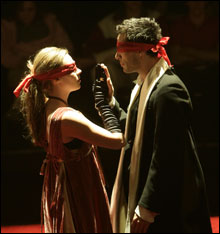 Forget star-cross’d. At the American Repertory Theatre, Romeo and Juliet are just plain cross. Pissed off. From start to finish. And so is everyone else in Israeli director Gadi Roll’s muscular and unsentimental staging of Shakespeare’s tragedy of flammable old hate, defiant young love, and despairingly bad timing. This Romeo and Juliet (at the Loeb Drama Center through March 25) is dark, striking, and determinedly aggressive. The audience is seated on two sides of a long, narrow playing space that is filled with sand, surrounded by steel grates, and flanked by metal-mesh doors that suggest “fair Verona” is as much a prison as Hamlet’s Denmark. Both a wrestling pit and a runway come to mind as Montagues and Capulets grovel in dirt and enmity and black-clad, punk-accessorized partygoers, their faces masks and their bodies blades, boogie to a musical mix of Baroque and techno. Roll’s is a deliberately belligerent, narrow reading of the play — one in which hearts and flowers give way to the nihilism of Edward Bond and Sarah Kane (a depressive playwright-poet of the English stage who committed suicide at 28), both of whom are quoted in the program. The staging is not stupid and it’s not namby-pamby, but neither does it tell the whole tale of woe “of Juliet and her Romeo.” And it certainly does not afford the actors a chance to run the gamut of their characters’ emotions.
Forget star-cross’d. At the American Repertory Theatre, Romeo and Juliet are just plain cross. Pissed off. From start to finish. And so is everyone else in Israeli director Gadi Roll’s muscular and unsentimental staging of Shakespeare’s tragedy of flammable old hate, defiant young love, and despairingly bad timing. This Romeo and Juliet (at the Loeb Drama Center through March 25) is dark, striking, and determinedly aggressive. The audience is seated on two sides of a long, narrow playing space that is filled with sand, surrounded by steel grates, and flanked by metal-mesh doors that suggest “fair Verona” is as much a prison as Hamlet’s Denmark. Both a wrestling pit and a runway come to mind as Montagues and Capulets grovel in dirt and enmity and black-clad, punk-accessorized partygoers, their faces masks and their bodies blades, boogie to a musical mix of Baroque and techno. Roll’s is a deliberately belligerent, narrow reading of the play — one in which hearts and flowers give way to the nihilism of Edward Bond and Sarah Kane (a depressive playwright-poet of the English stage who committed suicide at 28), both of whom are quoted in the program. The staging is not stupid and it’s not namby-pamby, but neither does it tell the whole tale of woe “of Juliet and her Romeo.” And it certainly does not afford the actors a chance to run the gamut of their characters’ emotions.
“Is love a tender thing?” asks Mickey Solis’s Romeo, as if he really sought the answer — which in this production is no. Like everything else, love is a brute outgrowth of an all-encompassing hostility that not only finds Montague and Capulet servants biting their thumbs at one another but has Will LeBow’s old Capulet barking at the County Paris come to woo, Che Ayende’s Mercutio rattling about Queen Mab as if she were a chip on his shoulder, and Annika Boras’s surly punk-princess Juliet — who does not remove her combat boots even to consummate her marriage — spending the entire balcony scene ricocheting between pique and frustration. When even “parting is such sweet sorrow” is as brusque as a handshake, you can forget “How silver-sweet sound lovers’ tongues by night/Like softest music to attending ears!”
There’s just no room in such a tough, anger-driven world for wonder or surrender or the Bard’s exquisite poetry — which must be rushed through as if it stood in the way of fate or the next street fight. Town, teens, and the body politic — as symbolized by John Campion’s limping and stuttering Prince Escalus — have all been sorely damaged by the ancient rancor that has everyone flexing a continuously itchy trigger finger. This may be a justifiable if radical interpretation of the play, in which “violent delights have violent ends.” But it’s pushed to such an extreme that the production, despite sound designer David Remedios’s mix of electric rock, sultry jazz, softly tinkling piano, and church music, seems one-note.